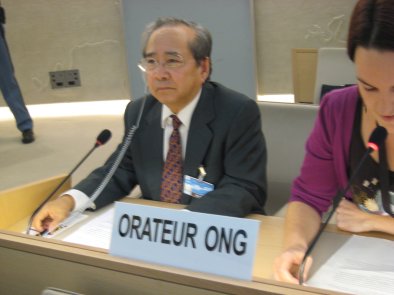GENEVA, 24 September 2009 (VCHR) – As the UN Human Rights Council met today to adopt the final report on the Universal Periodic Review of Vietnam, Mr Vo Van Ai, President of the Vietnam Committee on Human Rights (VCHR), denounced Vietnam’s rejection of a host of essential measures proposed by UN member states to advance human rights, whilst pursuing a ruthless crackdown on peaceful protesters in Vietnam.

“Today, the very day Vietnam appears before the Human Rights Council, a trial of eight pro-democracy activists including writer Nguyen Xuan Nghia, student Ngo Quynh, Nguyen Manh Son, Nguyen Van Tinh, Nguyen Van Tuc, Nguyen Kim Nhan, Pham Van Troi and schoolmaster Vu Hung was to take place before the People’s Courts in Haiphong and Hanoi” said Mr. Vo Van Ai. Arrested in September 2008 for peacefully protesting China’s claims over the Spratly and Paracel Islands, several of the group have been declared victims of arbitrary detention by the UN Working Group on Arbitrary Detention. “By detaining these peaceful critics unlawfully for a year, and putting them on trial for “national security” violations, despite UN recommendations, Vietnam is flagrantly flaunting its international obligations to respect human rights”, he said. This trial, scheduled for today, was reportedly postponed at the very last minute, without any explanation.
In an Oral Statement on behalf of the Paris-based International Federation for Human Rights (FIDH) and the VCHR, Mr. Vo Van Ai condemned Vietnam’s systematic refusal of 40 constructive recommendations, notably that of Canada and the USA “to repeal or revise its laws on “national security” and “the abuse of democratic freedoms to encroach on the interests of the State” – the very laws under which these peaceful critics are detained. Vietnam also refused a proposal by Poland to abrogate Ordinance 44 on “administrative detention” which authorizes detention of dissidents under house arrest or internment in psychiatric hospitals without any due process of law. These laws serve as “tools of state terror”, said Mr. Vo Van Ai. In Vietnam today, “freedom of expression, the press and peaceful assembly is cloaked in a climate of fear”.
Vietnam’s refusal of “all recommendations aimed at amending the press law, ensuring the independence of the media and liberalization of the Internet” is especially disturbing in view of an ongoing “wave of arbitrary arrests of journalists, bloggers, human rights lawyers and other government critics since Vietnam’s UPR review in May”. Online journalists and writers have been fired, arrested, forced to make “confessions” and renounce all free expression. Bloggers Nguyen Ngoc Nhu Quynh, (blog-name Mother Mushroom), Bui Thanh Hieu (the Wind Trader) and Pham Doan Trang, arrested in August and September 2009, were released on condition they cease online activities. Others arrested in the crack-down, including human rights lawyer Le Cong Dinh, Tran Anh Kim and Nguyen Tien Trung are awaiting trial on charges of “spreading anti-socialist propaganda”. “They face sentences of up to 20 years in prison”, Mr. Ai said.
Vietnam pursues this crackdown whilst seeking to mask repression from the public eye. It rejected recommendations by several countries during the UPR review to implement “a policy of transparency regarding its prisons and detention camps, provide information on the number of detainees and the reasons for their imprisonment, as well as information on the death penalty”.
Mr. Ai also condemned Vietnam’s refusal to issue standing invitations to Special Rapporteurs on freedom of expression, religion, torture, human rights defenders and the UN Working Group on Arbitrary Detention, requested by many European and Latin American states. Vietnam’s rejection of these “elementary measures of effective human rights protection gives us good reason to doubt Vietnam’s genuine willingness to respect its international commitments” he said.
Applauding the recommendation of Norway – refused by Vietnam – that civil society should be allowed to speak freely and defend human rights, Mr. Ai stressed the importance of religious freedom, especially in Vietnam, where “religious groups are amongst the sole remaining voices of civil society”, Mr. Vo Van Ai urged the government to implement the United States’ recommendation “to recognize independent religions and allow them to function freely, in particular the Unified Buddhist Church of Vietnam (UBCV). Detained dignitaries of independent religions, such as the UBCV Patriarch Thich Quang Do should be released and allowed to live normal lives, free from persecution”.
Vietnam’s responses to the UPR interactive dialogue revealed the government’s “narrow vision of human rights”, he said. “Claiming to respect human rights in principle does not mean they are respected in practice”. Moreover, whilst rejecting measures to genuinely advance human rights, Vietnam accepted proposals by certain states which “insidiously challenge the universality of human rights on the pretext of reconciling them with “specific circumstances” of Vietnam”.
“The UN should seriously re-examine the UPR process”, said Vo Van Ai. “The principle of a universal yardstick to measure and encourage human rights progress is a noble ideal. But in practice, the UPR is manipulated by non-democratic countries such as Vietnam to enhance their image internationally without making any concrete progress on the ground”.
At the UPR session today, after Mr. Vo Van Ai made copies of his speech available for distribution, the Vietnamese delegation surreptitiously “disappeared” them all. Mr. Vo Van Ai strongly protested: “Vietnam not only stifles its people’s voices at home, but even here in the United Nations, before the Human Rights Council, they blatantly censor the voices of civil society”.
This post is also available in:
 Quê Me Quê Me: Action for democracy in Vietnam & Vietnam Committee on Human Rights
Quê Me Quê Me: Action for democracy in Vietnam & Vietnam Committee on Human Rights



